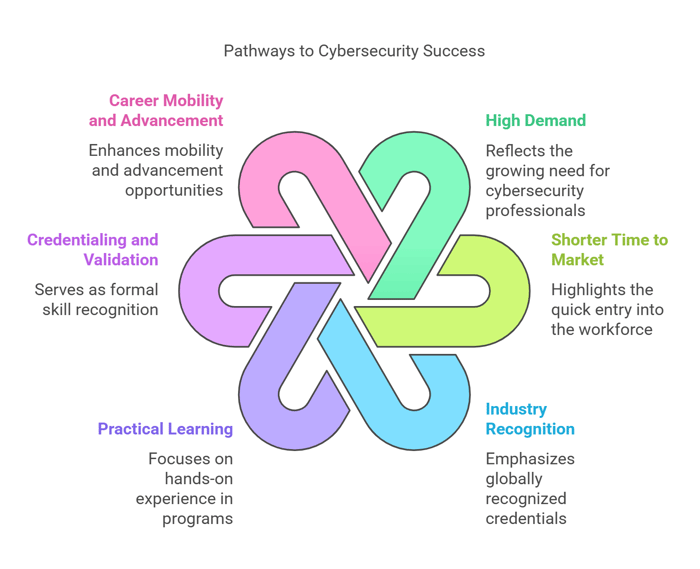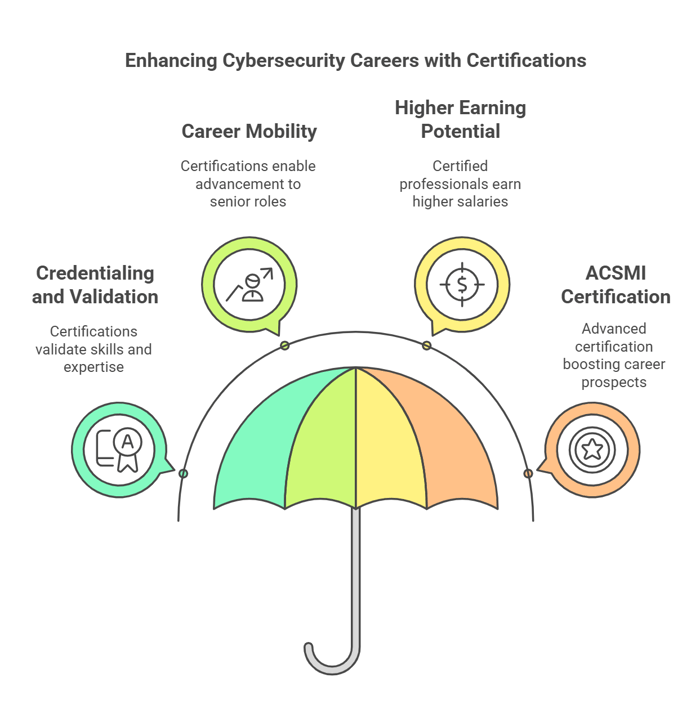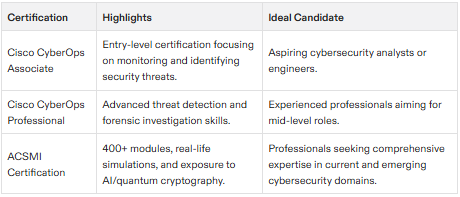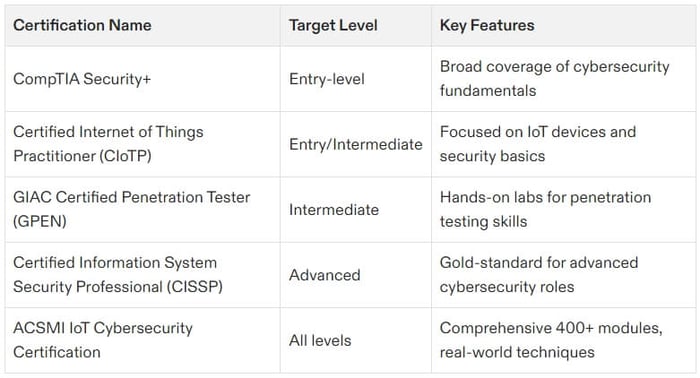Table of Contents
- What is the Cybersecurity Workforce Certification Training Program?
- Why Choose the Cybersecurity Workforce Certification Training Program?
- High Demand for Cybersecurity Professionals
- Shorter Time to Market
- Industry Recognition
- Practical Learning
- The Role of Certifications in Cybersecurity Careers
- Credentialing and Validation
- Career Mobility and Advancement
- Higher Earning Potential
- Pairing the Cybersecurity Workforce Certification with ACSMI Certification
- Why Combine ACSMI with Cybersecurity Workforce Certification?
- How Much Does the Cybersecurity Workforce Certification Training Program Cost?
- Career Opportunities After Completing the Cybersecurity Workforce Certification Training Program
- Final Thoughts
- FAQs About the Cybersecurity Workforce Certification Training Program
The field of cybersecurity continues to grow at an accelerated pace as the world becomes more interconnected, and the threat of cyberattacks increases. With cybersecurity risks mounting, the demand for skilled professionals has reached an all-time high. Aspiring cybersecurity experts looking to break into or advance in this field are turning to Workforce Certification Training programs as key pathways to their careers.
These Workforce Certification Training programs are designed to equip professionals with the technical skills, industry-recognized credentials, and hands-on experience necessary to succeed in a rapidly evolving industry. In this blog, we will explore the Cybersecurity Workforce Certification Training Program, its features, benefits, costs, career opportunities, and how pairing this certification with advanced training options such as ACSMI Certification can boost your career even further.
What is the Cybersecurity Workforce Certification Training Program?
The Cybersecurity Workforce Certification Training Program is a structured initiative created to help individuals gain the necessary skills and certifications to succeed in cybersecurity roles. These programs focus on providing both foundational knowledge and advanced training in areas like risk management, threat analysis, incident response, cloud security, and AI-driven cybersecurity.
Key Features of the Program:
Comprehensive Curriculum: Offers in-depth training across various domains of cybersecurity such as risk management, ethical hacking, network defense, and cloud security.
Real-World Application: Focuses on practical, hands-on labs and simulations that mimic real-world cybersecurity challenges.
Certification Pathways: Participants can earn globally recognized certifications such as CISSP, CompTIA Security+, and Certified Ethical Hacker (CEH).
Emerging Security Technologies: Covers new and evolving topics like zero-trust architecture, AI threats, and cloud security.
The program is designed to equip individuals with the knowledge and tools required to protect organizations from cyber threats and perform critical security operations.
Why Choose the Cybersecurity Workforce Certification Training Program?
With cybersecurity increasingly being recognized as a critical aspect of business operations, individuals seeking careers in the field often ask: Why should I choose a certification training program instead of a traditional degree?

High Demand for Cybersecurity Professionals
The rapid growth of the digital economy, combined with the rise in cybercrime, has made cybersecurity a priority for businesses and governments. As the demand for skilled professionals grows, certifications have become a key differentiator for job candidates. Certification programs are specifically designed to address industry needs, offering a targeted skill set that employers value.
Shorter Time to Market
Unlike traditional degrees that take several years to complete, cybersecurity certification programs can often be completed in a matter of months to a year. This enables individuals to enter the workforce much faster, providing a quick path to high-paying, in-demand roles.
Industry Recognition
Certification programs often provide globally recognized credentials, ensuring that professionals can find work anywhere in the world. Major organizations trust certifications like CompTIA Security+ and CISSP because they validate an individual’s ability to address cybersecurity challenges.
Practical Learning
One of the major advantages of certification programs is their emphasis on hands-on experience. Many programs offer practical labs and simulations where participants can directly apply their knowledge in controlled, real-world environments. This hands-on approach prepares you to perform actual job tasks effectively.
The Role of Certifications in Cybersecurity Careers
A Certification Philippines can be a game-changer in your career, particularly as the cybersecurity talent gap continues to grow. Whether you’re just starting or looking to advance, certifications can help you stand out in a competitive job market.

Credentialing and Validation
Certifications serve as formal recognition of your skills, and they help employers validate your expertise. This is especially important in cybersecurity, where a lack of credentials can prevent individuals from securing key positions. Certifications like CISSP, CEH, and CompTIA Security+ signal to employers that you have the necessary technical expertise to manage complex cybersecurity challenges.
Career Mobility and Advancement
Cybersecurity certifications also enhance your mobility within the industry. With each certification, you gain deeper insights into specialized areas of cybersecurity, such as penetration testing, cloud security, and incident response, paving the way for advancement into mid-level and senior roles like security analyst, network security manager, or chief information security officer (CISO).
Higher Earning Potential
Cybersecurity professionals with certifications can often command higher salaries compared to their non-certified peers. For instance, a CISSP-certified professional can earn between $100,000 and $150,000 annually, while entry-level roles with certifications like CompTIA Security+ offer salaries between $60,000 and $80,000. Specialized roles such as ethical hacker or cloud security architect often offer salaries in the range of $120,000 to $200,000.
Pairing the Cybersecurity Workforce Certification with ACSMI Certification
While the Cybersecurity Workforce Certification Training Program provides a solid foundation for building a cybersecurity career, pairing it with advanced certifications such as ACSMI Certification can significantly boost your expertise and career prospects.
Why Combine ACSMI with Cybersecurity Workforce Certification?
ACSMI’s 400+ modular certification is tailored to meet the demands of today’s cybersecurity landscape. It goes beyond basic knowledge by providing in-depth training in specialized areas such as AI in cybersecurity, blockchain security, cloud security, and more.
Key Features of ACSMI Certification:
Comprehensive Content: With over 400 modules, ACSMI covers everything from foundational cybersecurity topics to specialized domains like threat intelligence, AI-driven security, and quantum cryptography.
Hands-On Labs: ACSMI offers practical experience through interactive labs that simulate real-world cybersecurity attacks, giving participants the opportunity to apply their learning.
Global Recognition: ACSMI certifications are recognized by major global employers and offer flexibility in both career progression and geographical mobility.
By combining ACSMI Certification with your Cybersecurity Workforce Certification, you will acquire both general cybersecurity skills and specialized expertise that is highly valued in the industry.
How Much Does the Cybersecurity Workforce Certification Training Program Cost?
The cost of completing a cybersecurity workforce certification training program can vary based on several factors, including the level of certification, the training provider, and additional resources or workshops offered. Below is an estimated breakdown of costs:
Certification Exam Fees
Entry-Level Certifications: $300 - $600 (e.g., CompTIA Security+)
Mid-Level Certifications: $700 - $1,500 (e.g., Certified Ethical Hacker (CEH), Certified Information Systems Auditor (CISA))
Advanced Certifications: $2,000 - $5,000+ (e.g., CISSP, GIAC)
Training Material and Course Fees
Basic training materials and courses typically range from $1,000 to $2,500 for comprehensive packages.
Specialized workshops or mentorship programs can cost between $500 and $1,500.
Optional Resources
Many programs offer optional resources, such as live simulations and advanced labs, which can cost additional fees but offer significant value in terms of practical experience.
Despite these costs, the return on investment is substantial. Cybersecurity professionals with certifications enjoy significantly higher salaries and have access to advanced roles, making the investment well worth it.
Career Opportunities After Completing the Cybersecurity Workforce Certification Training Program
After completing the Cybersecurity Workforce Certification Training Program, you open yourself to a variety of exciting and lucrative career opportunities across different sectors. Let’s explore some of the key roles available in the cybersecurity industry:

1. Security Analyst
Security analysts monitor and protect an organization’s systems from cyberattacks. They identify vulnerabilities, implement security measures, and respond to security breaches. This role is essential in almost every industry, from finance to healthcare.
Salary Range: $60,000 - $100,000
Key Certifications: CompTIA Security+, CEH
2. Ethical Hacker
Also known as penetration testers, ethical hackers simulate cyberattacks to find weaknesses in systems. This role requires both offensive and defensive cybersecurity knowledge, making it a challenging yet highly rewarding career.
Salary Range: $80,000 - $130,000
Key Certifications: CEH, OSCP
3. Incident Responder
Incident responders act quickly to mitigate the impact of a cyberattack. They work to secure systems, recover data, and prevent future breaches. These professionals are crucial for organizations in highly regulated industries.
Salary Range: $70,000 - $120,000
Key Certifications: CISSP, CISM
4. Cloud Security Specialist
As more organizations move to cloud-based platforms, the demand for cloud security specialists has skyrocketed. These professionals focus on securing cloud infrastructures and ensuring data integrity in cloud environments.
Salary Range: $90,000 - $150,000
Key Certifications: CCSP, ACSMI Cloud Security Modules
Final Thoughts
The Cybersecurity Workforce Certification Training Program is a powerful stepping stone for individuals looking to enter or advance in the cybersecurity field. By earning globally recognized certifications, you gain the skills and credentials that are highly valued by employers. When combined with advanced programs like ACSMI Certification, you’ll enhance your ability to tackle the latest cybersecurity challenges while positioning yourself for higher salaries and leadership roles in the industry.
The future of cybersecurity is bright, and the demand for skilled professionals will only increase in the years to come. Investing in a cybersecurity certification today can set the foundation for a successful career in this dynamic and rewarding field.
FAQs About the Cybersecurity Workforce Certification Training Program
1. What is the Cybersecurity Workforce Certification Training Program?
The program is designed to equip individuals with the knowledge and practical skills required for various cybersecurity roles. It covers foundational cybersecurity topics and offers certification paths for globally recognized credentials such as CompTIA Security+, CISSP, and CEH.
2. How much does the program cost?
The cost of the program typically ranges from $1,500 to $5,000, depending on the level of certification, the provider, and additional resources or workshops included.
3. Can I complete this program online?
Yes, many organizations offer the program online, which makes it flexible and accessible for professionals balancing work or other commitments.
4. How long does it take to complete the program?
The duration varies depending on the certification path. Entry-level certifications like CompTIA Security+ can be completed in 2-3 months, while more advanced certifications like CISSP can take up to 6 months.
5. Can I transition from a non-IT background into cybersecurity?
Yes! Many cybersecurity certification training programs are designed for individuals with no prior IT experience. Starting with foundational courses like CompTIA Security+ is a great way to break into the industry.
6. Are there career opportunities after completing this program?
Yes, completing the program can open up a variety of roles in the cybersecurity field, including Security Analyst, Penetration Tester, Incident Responder, and Cloud Security Specialist.
7. How does ACSMI complement the Cybersecurity Workforce Certification Training Program?
ACSMI Certification offers advanced, specialized training in areas such as AI threats, cloud security, and quantum cryptography, which enhances the skills gained through the workforce certification program.
8. How do I decide which certification to pursue?
Your choice should depend on your career goals. If you’re new to the field, certifications like CompTIA Security+ or Google IT Cybersecurity Professional Certificate are a good starting point. If you’re aiming for leadership roles, CISSP or CISM might be better suited to your goals.





